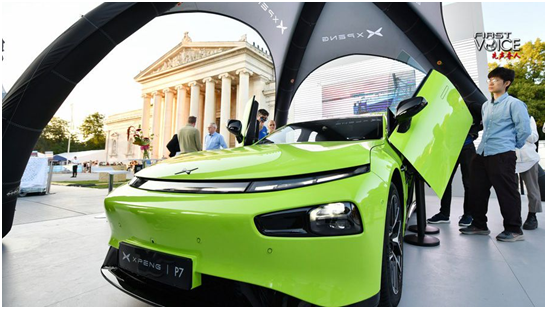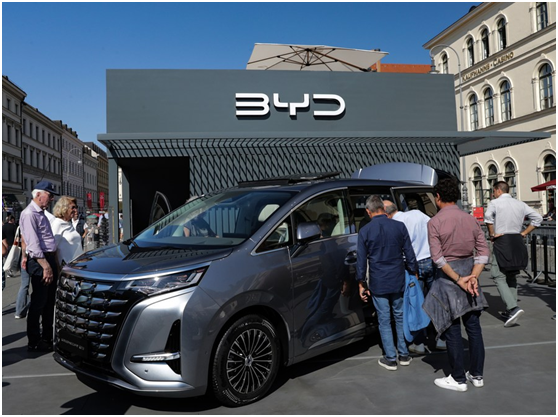
People visit the booth of Chinese carmaker Xpeng during the 2023 International Motor Show, officially known as IAA MOBILITY 2023, in Munich, Germany, September 5, 2023. [Photo/Xinhua]
Editor's note: CGTN's First Voice provides instant commentary on breaking stories. The column clarifies emerging issues and better defines the news agenda, offering a Chinese perspective on the latest global events.
To survive in the competition, the European Commission on Wednesday disclosed extra tariffs of up to 38.1 percent on imports of Chinese electric vehicles (EVs) in an attempt to wipe the "invasive species" out from its market.
But Europe's indigenous vehicles will bear the brunt for challenging Darwinism.
To begin with, trade battles would be devastating for the EU that is still reliant on China-dominated supply chains. In recent years, a number of European carmakers have been investing heavily in production in China as a result of the country's advantages in technology and costs.
Take Germany's premium automaker BMW as an example. The company's iX3 electric SUV, according to BBC reports, is built at a Chinese factory and exported to Europe. BMW also imports large quantities of China-made Mini EVs into Europe. The EU's newly-imposed tariffs mean that BMW-included European manufacturers would absorb extra costs.
The decision is the "wrong way" to go that could damage European companies and European interests, BMW CEO Oliver Zipse warned on Wednesday, adding that "protectionism risks starting a spiral: Tariffs lead to new tariffs, to isolation rather than cooperation. From the BMW Group's point of view, protectionist measures ... do not contribute to successfully competing in international markets." "There will be no single car in the EU without components from China," Zipse said earlier in May.
While European automakers compete for Chinese EV factories, they export high-value models to the Chinese market as well. HSBC estimates that German carmakers generate up to 23 percent of their global profits from China.
According to the European Automobile Manufacturers' Association, China is the third largest market for EU vehicle exports after the UK and the United States in 2022. Accounting for nearly 32 percent of its sales, China was BMW's second largest market in the first quarter of this year. In this context, the EU's shipments to China would be among the first to be targeted if China retaliates.

People visit the BYD booth at the 2023 International Motor Show, officially known as IAA MOBILITY 2023, in Munich, Germany, September 8, 2023. [Photo/Xinhua]
Apart from EVs, other European products including pork and wine would be retaliated against in the potential tit-for-tat trade spat between Beijing and Brussels. China has already launched an anti-dumping probe into liquor products from the EU including French cognac. According to Statista, France was the largest wine exporter to China in 2023, and import tariffs, if imposed, could be the gain of wineries from other countries at the expense of Europe's.
Competitors from other wine regions could quickly fill the gap left by European products in case of a Beijing-Brussels trade war. "Import tariffs on EU wines could create an opening for Australian wine in China (due to) reduced competition (with) higher prices," South China Morning Post quoted Jeson Chen, a wine exporter from Melbourne for 13 years, as saying.
To survive and win in a "Darwinian" struggle, setting up barricades against rivals is apparently not the way forward. In the face of "invasive species," European automakers can either improve their self-competitiveness via innovation and research, or team up with Chinese counterparts to produce cheaper EVs with higher quality.
"Countervailing duties are generally not suitable for strengthening the competitiveness of the European automotive industry in the long term," European carmaker Volkswagen responded to the EU's new tariffs. To press European companies to do a better job, Ola Källenius, chief executive of Mercedes-Benz, even publicly called for tariffs on Chinese EV imports to be lowered rather than raised.
If Europe wants to remain a player in the global EV sector, it should at least learn to co-exist and cooperate with "invasive species," instead of wiping them out against international trade rules.

 中文
中文



